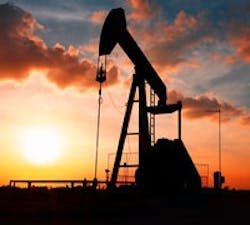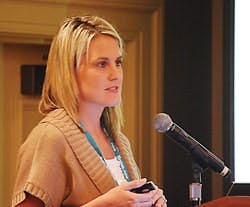Users Sparked by Search for Unconventional Gas
By Jim Montague, Executive Editor
Oil and gas people always like a good challenge. So even though some fuel sources may be getting harder to find, it seems as though many extractors, refiners and transporters are actually inspired and energized by the increasing hurdles they face these days.
Such was the mood at the Oil and Gas Industry Forum on the first day of the Emerson Global Users Exchange this week in Nashville, Tenn. The panel session was filled to standing room only.
"Interest in unconventional natural gas is increasing rapidly, and this is raising a lot of new and important questions, such as which countries are coming forward as new sources," said David Newman, director of oil and gas production for Emerson Process Management. "There are also a lot of minor independent companies coming in, and many national oil companies are getting involved as well."
"The challenge of shale oil is that it's basically coming out of the ground faster than we can get pipes in place," Isaacs said. "We're trucking a lot out of our leased areas, but it's also difficult to schedule trucks and make sure they'll be available. So we're relying a lot more on Rosemount radar gauges to check tanks levels, which means our drivers don't have to suit up to do it. Chesapeake is traditionally a gas company, but now we're also trying to view ourselves as an oil and gas company. Our goal is to increase production to 150,000 barrels of liquid per day by the end of the year."
Of course, ExxonMobil operates on a slightly larger scale than Chesapeake, but it faces many of the same challenges as it also seeks to find and secure unconventional oil and gas sources, said Alex Guiscardo, ExxonMobil's global facilities engineering manager.
"Shale gas was historically poorly understood and was almost a non-entity at one time, but now it accounts for almost a third of the total natural gas reserves in North Amerca," Guiscardo said. "In the past, we weren't watching closely what was going on with unconventional natural gas, but we are now, and we've learned rapidly about it." Thanks to three recent acquisitions and its own recent efforts, he added that ExxonMobil is now the largest natural gas producer in the United States.
To succeed with unconventional fuels on a long-term basis, ExxonMobil is using an especially responsible operating philosophy, Guiscardo reported. "When we produce unconventional oil and gas, we're trying to be as safe, reliable and affordable as possible, as well as meet the environmental expectation of the residents around these resources," he said. "We're going into a lot of places now where people aren't used to seeing us. In addition, because fracking and groundwater are also in the news a lot, Exxon also believes that we should publicly disclose the content of our fracking fluids. It's 99% water and sand and then a few chemicals, but we feel that education and sharing with the public is the right thing to do, especially because this resource can help the United States become energy-independent."



